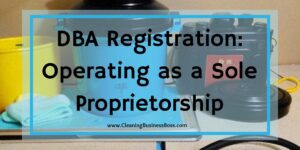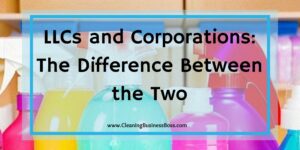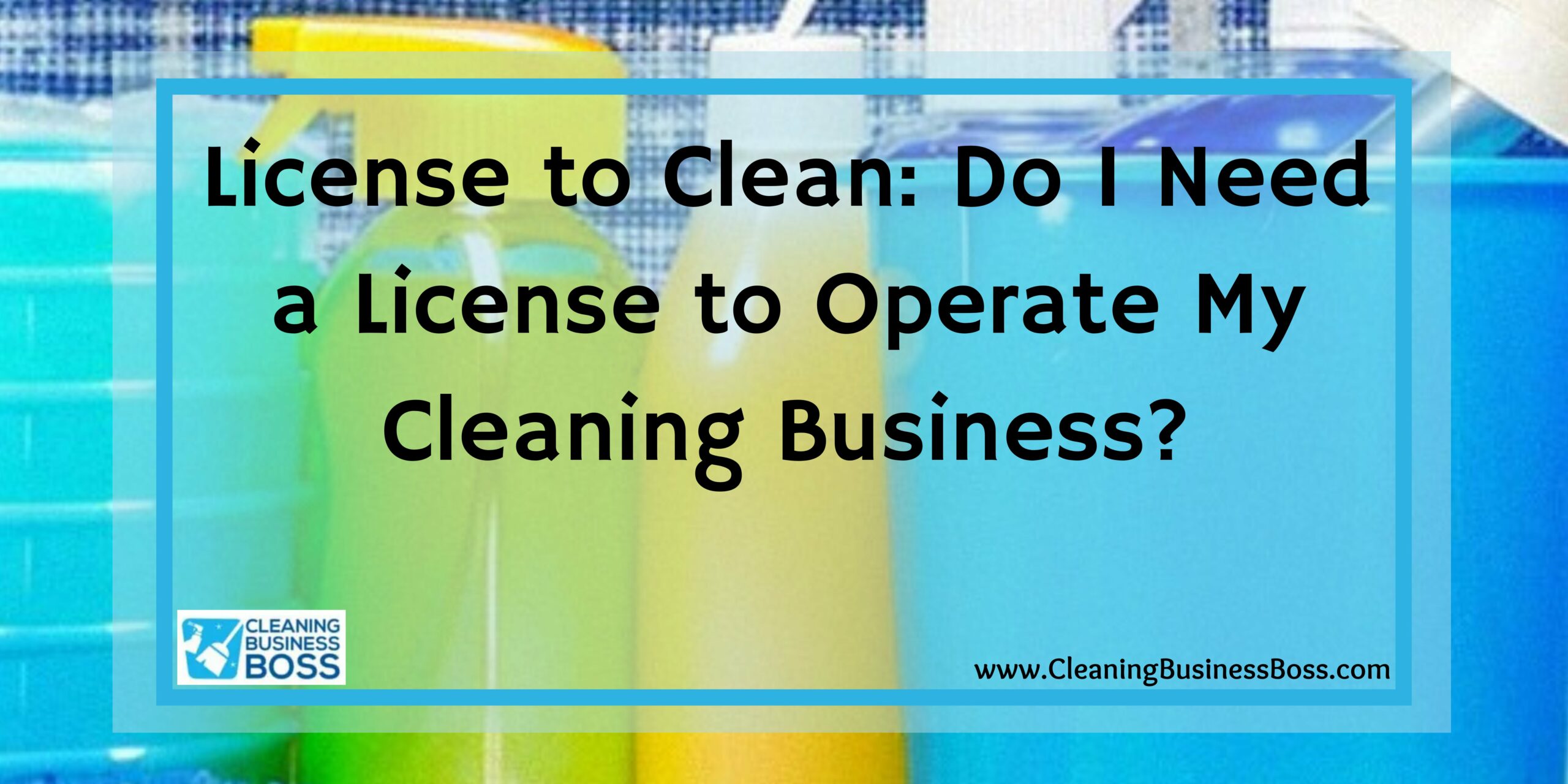Cleaning businesses are a great way to work for yourself. You want to make sure your business is set up legitimately and legally, but do you need a license when to own and operate your cleaning business?
Yes, you will need a vendor’s license and a general business license to operate your cleaning business correctly. Additionally, you will need to decide on a structure for your business. It would also be in your best interest to obtain certain types of bonds used in operating cleaning businesses. These will protect your business and your clients.
To start your business the right way, you’ll need an understanding of the following:
- The Importance of Vendor’s Licenses
- DBA Registrations: Operating as a Sole Proprietorship
- LLC’s and Corporations: The Difference Between the Two
- Bonds for Cleaning Businesses: The Value They Provide
The Importance of Vendor’s Licenses
Getting a vendor’s license will allow you to legally own and operate a cleaning business. No matter what city and state you live in, you are required to have a vendor’s license. You need a vendor’s license for several reasons, but chief among them is for sales tax purposes.
You can apply for your vendor’s license at the city clerk’s office or another administrative office in your area. All non-wholesale revenue is subject to a sales tax at the business’s responsibility (Suttle, n.p.). A vendor’s license allows you to legally charge a sales tax for your services (Suttle, n.p.).
Your vendor’s license will not be issued until your business license has been approved. Therefore, you’ll need to determine whether you will operate under a Doing-Business-As (DBA) registration, a limited liability corporation (LLC), or another type of corporation.
DBA Registration: Operating as a Sole Proprietorship

You can apply for your DBA registration at the same time as your vendor’s license. You should choose a DBA name when you need to operate under a business name without the separation of your personal assets and business assets. This means that if the business fails, you risk your personal assets as you are “personally” held responsible, so proceed with caution. Registering a DBA name may be right for you if:
- You are starting very small – If you don’t intend to have many customers, or you are just testing out your cleaning business, using a DBA is perfectly fine.
- You plan to work by yourself for a while – A DBA is a good choice for your business if you don’t plan on hiring additional employees when you’re starting out.
It is crucial that you keep your business and personal financial matters separate, even when using a DBA. An LLC or corporation may serve as a better option for your cleaning business.
Check out this article to know the cost of starting a cleaning business.
LLCs and Corporations: The Difference Between the Two

Limited liability companies, or LLCs, are ideal for small business owners as they legally protect your personal assets. You can apply for an LLC at your local governmental agency. LLCs are more suitable for smaller companies and can be taxed in a number of ways, including the following:
- Sole Proprietorship
- Partnership (as an LLC or Corporation)
- S Corporation
- C Corporation
Depending on your cleaning business’s structure, you might have to pay self-employment taxes. This is a typical occurrence within sole proprietorships and LLCs.
Corporations differ slightly. Your cleaning business could be double-taxed because corporations are subject to corporate income tax in addition to other taxes. You can always register your business as an S Corporation to avoid double taxation; however, any of your shareholders will be taxed on their personal incomes. Like LLCs, structuring your business as a corporation protects your personal assets.
LLCs may be the better option for a small, local cleaning business. Consider the following:
- If you will be the sole owner, or if you will operate with a business partner, it would be more straightforward for you to structure your business as an LLC.
- The filing fees for an LLC are much more affordable than that of a corporation. A corporation’s filing fees increase with the number of shares you begin the business with. If you plan to keep your business small, an LLC would be your best bet.
- There are more requirements with a corporation. An LLC simply needs an operating agreement for the business is operates, along with annual fees. Corporations require annual meetings, tracked minutes, bylaws, shareholders, and more. If your cleaning business is small, it would not be worth the hassle to structure your business as a corporation.
These are a few things to consider when deciding your legal business structure while filing for your vendor’s license. There are other things you can file for, but they aren’t necessary however they are quite useful. Bonds are great to obtain for our cleaning business as they provide additional protection.
Check out this article to get an idea how much do cleaning businesses make.
Bonds for Business: The Value They Provide

There are two bonds that cleaning businesses should consider. Surety bonds financially protect your cleaning business and your customers. If your clients fail to receive your services for any reason, this bond is the source that fairly reimburses them. These bonds are good to have for any business in general, but especially if you have only a couple of employees or even just yourself. Surety bonds provide the protection you need to operate your small business and give your customers a risk-free guarantee, no matter what life events may occur.
License and permit bonds are what you will need for government clients within your area. These bonds give the city-level government the legal protection they need for doing business with you. Your local government could be sued for poor workmanship. License and permit bonds ensure that if the worst-case scenario happens, your cleaning business and local government clients will not have to experience a loss.
Summary
Many people are considering ownership of a cleaning business because of the entrepreneurial opportunity. People often question what licenses or permits are needed to operate legitimately. Simply put, you will need your vendor’s license and general business license. You will have to decide if you will run your business with a doing-business-as registration, known as a DBA; if you will operate as a limited liability company, known as an LLC; or even operate as a full-fledged corporation. In addition, you may want to consider license and permit bonds and surety bonds for added protection and job opportunities. Don’t face fines and legal trouble. Follow the requirements for your area, and you’ll be licensed to clean.
Frequently Asked Questions
What are the costs of filing for all appropriate licenses?
The amount needed can varies by state because states charge different amounts for different types of licenses. Initially, you need to:
- Check which local department handles vendor’s license applications as that too can vary by state. A vendor’s license can typically be 50 dollars or less (Suttle, n.p.).
- Determine your legal business structure (LLC, DBA, etc.), then find your state’s filing fees for that business structure.
Is it better to file for these licenses through a third party?
Going through a third party is not really necessary Most individuals can file for these on their own with ease. Using a third party will increase the cost of obtaining your licenses. Only file for licenses through a third party if:
- You are limited on time and need extra assistance to complete the steps to file.
- The extra costs will not be of inconvenience to you. (Most startups have a lean start and must use funding wisely.)
- You feel uncomfortable handling this on your own or within your partnership. Some entrepreneurs outsource certain tasks within their businesses due to lack of knowledge. They do not have extra time to learn about a certain area of their business and would rather hire someone to handle it – and that’s okay.
Is any legal assistance needed for this filing process?
Legal assistance is not a necessity, but some people do hire a lawyer for peace of mind. A lawyer can help determine your business structure, among many other things. Most business owners aren’t experts in everything, and legal advice helps them make well-informed decisions for their business. Consider hiring a lawyer if your startup funds allow it, but don’t dismay if you can’t afford to do so. There many business owners who have successfully filed for licenses for their cleaning business on their own.
Insureon, Insureon. “Dusting Up on Business Licenses, Bonds, and Contracts: Legal Documents for Cleaning Businesses.” Insureon, Insureon, 2014, buildingservices.insureon.com/resources/business-center/licenses-bonds-contracts.
Suttle, Rick. “What Do You Need to Start a Home Cleaning Business?” Small Business – Chron.com, Chron.com, 4 Mar. 2019, smallbusiness.chron.com/need-start-home-cleaning-business-4493.html.
UpCounsel, UpCounsel. “What License Is Needed to Start a Cleaning Business.” UpCounsel, UpCounsel, 2019, www.upcounsel.com/what-license-is-needed-to-start-a-cleaning-business.
To learn more on how to start your own cleaning business, check out my startup documents here.
Please note that the contents of this blog are for informational and entertainment purposes only and should not be construed as legal advice. Any action taken based on the information provided in this blog is solely at your own risk. Additionally, all images used in this blog are generated under the CC0 license of Creative Commons, which means they are free to use for any purpose without attribution.

About the author. Entrepreneur and Cleaning Business Fan.
Hi! I am Shawn and I am a happy individual who happens to be an entrepreneur. I have owned several types of businesses in my life from a coffee shop to an import and export business to an online review business plus a few more and now I create online cleaning business resources for those interested in starting new ventures. It’s demanding work but I love it. I do it for those passionate about their business and their goals. That’s why when I meet a cleaning business owner, I see myself. I know how hard the struggle is to retain clients, find good employees and keep the business growing all while trying to stay competitive.
That’s why I created Cleaning Business Boss: I want to help cleaning business owners like you build a thriving business that brings you endless joy and supports your ideal lifestyle.



4 thoughts on “License to Clean: Do I Need a License to Operate My Cleaning Business?”
Comments are closed.